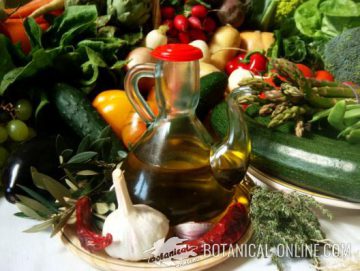Contents
- 1 What oils are healthy to eat?
- 1.1 What is the best type of oil according to scientists?
- 1.2 Why is olive oil the most recommended? Benefits of omega 9 or oleic acid
- 1.3 Is coconut oil good?
- 1.4 Is coconut oil better than olive oil?
- 1.5 Is coconut oil most recommended than olive oil?
- 1.6 Is it recommended to take sunflower, flaxseed or sesame oil?
- 1.7 Which oils are better?
What oils are healthy to eat?
What is the best type of oil according to scientists?

All the scientists of the world agree that olive oil it is a very good oil, and it is one of the most praised ingredients of the Mediterranean diet.
Due to its characteristics, it is the most praised type of oil and the one most supported by numerous scientific studies that agree on its healthy properties.
The benefits of olive oil are that it is rich in oleic acid and has a balanced ratio in omega 3 and 6.
In addition, oils of good quality (virgin or cold pressure) provide a lot of vitamin E and polyphenols.
Why is olive oil the most recommended? Benefits of omega 9 or oleic acid
The main characteristic of olive oil is its high content of omega 9 or oleic acid, a type of fat that is considered very healthy.

Monounsaturated fatty acids are more stable and resist heat and oxidation better (by light, contact with oxygen, etc.). For this reason, the type of fats provided by olive oil is a good foundation to form new cells in our body, in addition to being the most suitable for cooking (more resistant to temperature).
Unfortunately, olive oil may be an unavailable product outside of Europe, the region where it is most grown.
- There is no problem in replacing this oil with another cheaper, depending on the country in which we are.
* See: Olive oil substitutes
Is coconut oil good?
It is increasingly common to hear about the benefits of coconut oil, which is rich in lauric acid, a medium-chain fatty acid that has not shown atherogenic effects. That is, coconut oil virgin in moderation, does not harm the health of the heart.

Is coconut oil better than olive oil?
It is always important to note that only virgin coconut oil has these properties, and when taken in moderate quantities.
The bad reputation of this oil is due to the fact that it is mainly found in processed foods (chocolates, pasta, chips, snacks, etc.) and in its hydrogenated form, presenting trans fats harmful to health.
Is coconut oil most recommended than olive oil?
Coconut oil is no more advisable than olive oil, so in countries where olive oil is available at an affordable price, it is better to consume good quality olive oil than virgin coconut oil.
Olive oil is better because it has more benefits and is supported by more studies, and because it has a large amount of flavonoids and antioxidant vitamins, superior to coconut. However, virgin coconut oil can be an alternative to olive oil in countries where olive oil is not available at an affordable price.
Is it recommended to take sunflower, flaxseed or sesame oil?
Seed oils are very common: sunflower oil, flax oil, walnut oil, sesame oil, etc. Are they recommended?
The main disadvantage of these oils is their high content of polyunsaturated fats, known as omega 3 and omega 6. This type of fats deteriorate relatively easily, so it is not appropriate for the diet to be excessive in seed oils. It is also not recommended to cook with them usually because they smoke easily.
The advantage of seed oils is that they contain more vitamin E (antioxidant) than olive oil, but these types of oils should not be abused due to their polyunsaturated fat profile, mentioned above.
- It is recommended that the seed oils be used in good quality, in small quantities, and better in the raw (salads, dressings, etc.).
Which oils are better?

We can classify them in the following way:
![]() The most recommended oil for seasoning and cooking is olive oil. Among the different types, it is preferable to use virgin oils, obtained by cold pressure, because they contain more flavonoids and vitamin E.
The most recommended oil for seasoning and cooking is olive oil. Among the different types, it is preferable to use virgin oils, obtained by cold pressure, because they contain more flavonoids and vitamin E.
![]() Most recommended seed oils, in moderation: high oleic canola oil, virgin sunflower oil (cold pressed first, not refined), wheat germ oil (first cold pressed, the food richest in vitamin E.)
Most recommended seed oils, in moderation: high oleic canola oil, virgin sunflower oil (cold pressed first, not refined), wheat germ oil (first cold pressed, the food richest in vitamin E.)
![]() Seed oils should only be used raw, not for frying or cooking. See: Oils for frying.
Seed oils should only be used raw, not for frying or cooking. See: Oils for frying.
![]() Oils that should be avoided (too omega, they deteriorate easily, even if they are of good quality): soybean oil, peanut oil , sesame oil, walnut oil, linseed oil, Brazil nut oil ,etc.
Oils that should be avoided (too omega, they deteriorate easily, even if they are of good quality): soybean oil, peanut oil , sesame oil, walnut oil, linseed oil, Brazil nut oil ,etc.
![]() It is best to eat the last ones in the form of food, because their fats are better preserved and also provide more nutrients, for example: flaxseeds, walnuts, chia seeds or hemp seeds.
It is best to eat the last ones in the form of food, because their fats are better preserved and also provide more nutrients, for example: flaxseeds, walnuts, chia seeds or hemp seeds.
- In general, it is better to obtain omega 3 and omega 6 fats from foods than from oils: sesame, hemp seeds, tahini, walnuts, chia, flax, etc.
![]() More information on vegetable oils
More information on vegetable oils
10 January, 2024








